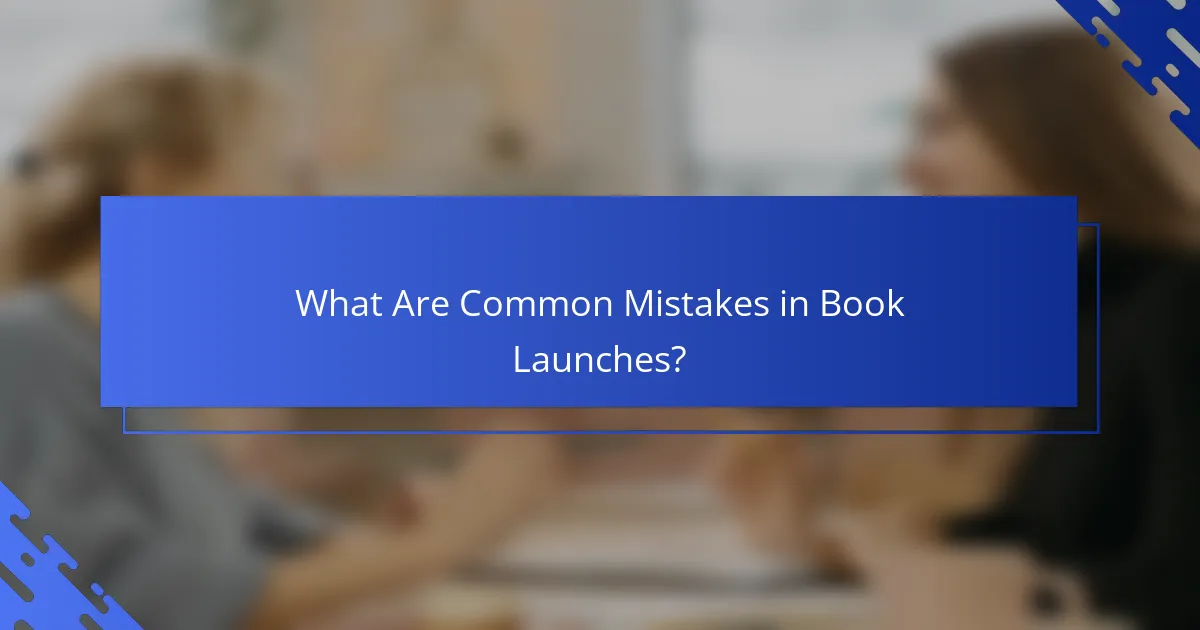Launching a book successfully requires a well-rounded approach that combines effective promotional tactics to enhance visibility and drive sales. Key strategies include leveraging social media, forming partnerships with influencers, and utilizing targeted advertising. Additionally, choosing the right timing for your launch can significantly influence its success, making it crucial to consider seasonal trends and market research. By implementing these strategies, authors can maximize their book’s reach and impact in the market.

What Are Effective Book Launch Strategies?
Effective book launch strategies involve a combination of promotional tactics designed to maximize visibility and sales at the time of release. Key approaches include leveraging social media, forming influencer partnerships, hosting virtual events, utilizing email marketing, and creating engaging book trailers.
Social Media Campaigns
Social media campaigns are essential for generating buzz around your book launch. Platforms like Facebook, Instagram, and Twitter allow authors to connect with potential readers through targeted posts, stories, and ads. Consider using a mix of organic content and paid promotions to reach a wider audience.
Engage your followers with teasers, behind-the-scenes content, and countdowns to the launch date. Utilize relevant hashtags to increase discoverability and encourage user-generated content by asking readers to share their excitement.
Influencer Partnerships
Partnering with influencers can significantly amplify your book’s reach. Identify influencers in your genre who have an engaged following and align with your book’s themes. Offer them advance copies for honest reviews or host giveaways to attract their audience.
When approaching influencers, personalize your pitch and clearly articulate the benefits of collaboration. This could include cross-promotion on social media or featuring them in your launch events, creating a win-win situation.
Virtual Launch Events
Virtual launch events allow authors to connect with readers in real-time, regardless of location. Platforms like Zoom or Facebook Live can facilitate readings, Q&A sessions, and discussions about the book. Promote the event through your social media and email lists to maximize attendance.
Consider incorporating interactive elements, such as polls or giveaways, to keep the audience engaged. Record the event for those who can’t attend live, and share it later to extend its reach.
Email Marketing
Email marketing remains a powerful tool for book launches. Build a mailing list of interested readers and send out newsletters leading up to the launch. Include exclusive content, such as sample chapters or insights into your writing process, to entice subscribers.
Segment your audience to tailor messages based on their interests. A well-timed launch email can create urgency, encouraging immediate purchases and boosting initial sales rankings.
Book Trailers
Book trailers are short videos that visually promote your book, similar to movie trailers. They can be shared on social media, your website, and during virtual events to capture attention. A compelling trailer should highlight the book’s themes, characters, and unique selling points.
Keep the trailer concise, ideally under two minutes, and ensure it reflects the tone of your book. Use high-quality visuals and sound to create a professional impression, and consider including a call to action directing viewers to purchase the book.

When Is the Best Time to Launch a Book?
The best time to launch a book depends on various factors, including seasonal trends, market research, and the author’s availability. Timing can significantly impact visibility and sales, so it’s essential to choose a strategic launch window.
Seasonal Trends
Seasonal trends play a crucial role in determining the optimal launch time for a book. For instance, launching in the fall can be advantageous due to the holiday shopping season, which typically sees increased consumer spending. Conversely, summer months may be less favorable as many readers are on vacation and less engaged with new releases.
Consider aligning your launch with specific events or holidays relevant to your book’s theme. For example, a romance novel might benefit from a Valentine’s Day release, while a self-help book could align with New Year resolutions.
Market Research Insights
Conducting market research can provide valuable insights into reader preferences and buying habits. Analyzing sales data from similar genres can help identify peak times for book purchases. For instance, certain genres may see spikes during specific months or events, such as back-to-school for educational materials.
Utilizing tools like Google Trends or social media analytics can also help gauge interest in your book’s topic, allowing you to time your launch for maximum impact. Engaging with your target audience through surveys can further refine your timing strategy.
Author Availability
Author availability is a critical factor in planning a book launch. Ensure you have sufficient time to prepare marketing materials, engage with readers, and participate in promotional events. A rushed launch can lead to missed opportunities for visibility and sales.
Consider your personal schedule and commitments when selecting a launch date. If you have other obligations, such as speaking engagements or personal events, it may be wise to choose a time when you can fully dedicate yourself to the launch efforts.

How to Promote a Book Successfully?
To promote a book successfully, focus on a mix of targeted advertising, engaging book reviews, and effective public relations outreach. These strategies can help increase visibility and attract potential readers, ultimately driving sales.
Targeted Advertising
Targeted advertising involves placing ads where your potential readers are most likely to see them. Utilize platforms like Facebook, Instagram, and Google Ads to reach specific demographics based on interests, age, and location.
Consider setting a budget that allows for flexibility; starting with a few hundred dollars can help you gauge which ads perform best. Monitor engagement metrics to refine your approach and maximize return on investment.
Book Reviews and Giveaways
Book reviews are crucial for building credibility and attracting interest. Reach out to book bloggers, influencers, and readers on platforms like Goodreads to request reviews in exchange for a free copy.
Hosting giveaways can also generate buzz. Use social media or your website to run contests, encouraging participants to share the giveaway to increase visibility. Aim for a balance between the number of copies given away and the potential reach of your promotion.
Public Relations Outreach
Public relations outreach involves connecting with media outlets to gain coverage for your book. Create a press release highlighting the unique aspects of your book and target relevant publications, podcasts, and blogs.
Consider offering interviews or guest posts to engage with audiences directly. Building relationships with journalists and influencers can lead to ongoing opportunities for exposure, so maintain these connections even after your book launch.

What Are the Prerequisites for a Successful Launch?
A successful book launch requires careful planning, a solid author platform, and an engaged launch team. These elements help ensure that your book reaches its target audience effectively and generates buzz.
Building an Author Platform
Building an author platform involves establishing a strong online presence and connecting with your audience. This can include a professional website, active social media profiles, and a mailing list to keep readers informed about your work.
Consider sharing valuable content related to your book’s themes, such as blog posts, videos, or podcasts. Engaging with your audience through comments and messages can also foster a loyal community that supports your launch.
Creating a Launch Team
A launch team consists of dedicated individuals who help promote your book before and during its release. This team can include friends, family, fellow authors, and avid readers who are willing to spread the word and provide reviews.
To create an effective launch team, clearly communicate your goals and provide them with resources such as sample posts, graphics, and advanced reader copies. Regular updates and encouragement can keep your team motivated and engaged throughout the launch process.

How to Measure Book Launch Success?
Measuring book launch success involves evaluating various metrics that reflect both sales performance and reader engagement. Key indicators include sales figures, audience interaction, and overall visibility in the market.
Sales Metrics
Sales metrics are crucial for assessing the financial success of your book launch. Key figures to track include total sales volume, revenue generated, and sales trends over time. Comparing these metrics against your initial goals can provide insight into the effectiveness of your launch strategy.
Consider monitoring sales across different platforms, such as Amazon, local bookstores, and direct sales through your website. This can help identify which channels are most effective and where to focus future marketing efforts.
It’s also beneficial to analyze sales data in the context of your genre and target audience. For instance, a successful launch in the fiction category may yield different sales expectations compared to non-fiction or children’s books.
Engagement Analytics
Engagement analytics provide insight into how readers are interacting with your book and promotional content. Key metrics include social media shares, website visits, newsletter sign-ups, and reviews. These indicators help gauge audience interest and the effectiveness of your promotional strategies.
Utilizing tools like Google Analytics can help track website traffic and user behavior, while social media platforms often provide insights into post engagement and audience demographics. This data can inform future marketing decisions and content creation.
Engagement metrics can also include reader feedback through reviews and ratings. High engagement levels often correlate with increased sales, as satisfied readers are more likely to recommend your book to others.

What Are Common Mistakes in Book Launches?
Common mistakes in book launches can significantly hinder a book’s success. Key errors include neglecting the target audience and failing to plan adequately before the launch date.
Ignoring Target Audience
Ignoring the target audience is a critical mistake that can lead to poor engagement and sales. Understanding who your readers are helps tailor your marketing strategies effectively.
To avoid this pitfall, conduct thorough research on your audience’s preferences, demographics, and reading habits. Create reader personas to guide your promotional efforts and ensure your messaging resonates with them.
Insufficient Pre-Launch Planning
Insufficient pre-launch planning can result in missed opportunities and a lack of visibility for your book. A well-structured plan should include timelines, promotional activities, and a clear strategy for reaching your audience.
Start planning at least several months in advance. Consider creating a checklist that includes tasks like building an email list, engaging with potential readers on social media, and organizing pre-launch events such as cover reveals or giveaways.

What Tools Can Assist in Book Promotion?
Various tools can significantly enhance book promotion efforts, helping authors reach their target audience effectively. These tools range from social media platforms to email marketing services, each offering unique features to boost visibility and engagement.
Social Media Platforms
Social media platforms like Facebook, Instagram, and Twitter are essential for promoting a book. They allow authors to connect directly with readers, share updates, and create buzz around their launch. Utilizing targeted ads can further enhance reach, especially when focusing on specific demographics.
Consider creating dedicated pages or profiles for your book to centralize content and engage with followers. Regular posts, behind-the-scenes content, and interactive stories can keep your audience interested and invested in your book’s journey.
Email Marketing Services
Email marketing services such as Mailchimp or Constant Contact are effective for reaching readers directly. Building a mailing list allows authors to send personalized updates, exclusive content, and launch announcements. Aim to segment your audience based on interests to tailor your messages for better engagement.
Utilize automated campaigns to welcome new subscribers and remind them of upcoming events. Offering a free chapter or bonus content in exchange for email sign-ups can also grow your list while providing value to potential readers.
Book Promotion Websites
Book promotion websites like BookBub and Goodreads can amplify your book’s visibility. These platforms often feature deals, giveaways, and promotional spots that can attract a larger audience. Submitting your book for promotional opportunities can lead to increased downloads and reviews.
Consider timing your promotions strategically, such as during a price drop or a special event, to maximize impact. Engaging with readers through these platforms can also foster community and encourage word-of-mouth promotion.
Analytics Tools
Analytics tools such as Google Analytics and social media insights are crucial for tracking the effectiveness of your promotional efforts. These tools provide data on user engagement, traffic sources, and conversion rates, allowing you to refine your strategies based on real-time feedback.
Regularly review your analytics to identify which promotional tactics yield the best results. Adjust your approach accordingly to focus on high-performing channels and optimize your overall marketing strategy.
